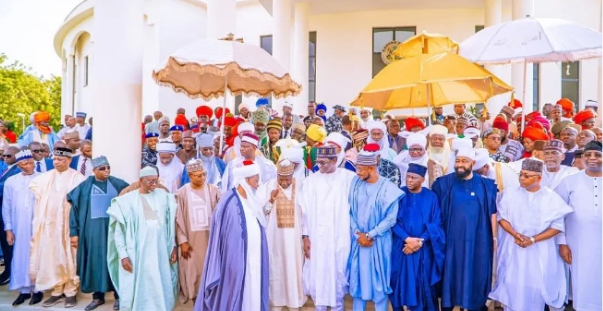780
By Tracy Moses
Traditional leaders from Nigeria’s North West geo-political region have called on the National Assembly to enshrine constitutional recognition for traditional institutions as part of the ongoing review of the 1999 Constitution.
They cautioned that the unchecked proliferation of emirates, kingdoms, and chiefdoms, often without cultural or historical foundation, is undermining national cohesion and effective leadership at the grassroots.
Speaking at the North-West Zonal Public Hearing (Centre B) on the 2025 Constitution Review held in Sokoto, His Highness, Justice Lawal Hassan Gummi, Emir of Gummi and Chairman of the Coordinating Committee of the Northern Traditional Rulers Council (NTRC), voiced concerns over increasing political intrusion into the domain of traditional leadership.
The Emir emphasized that such political meddling is weakening the traditional institution’s ability to contribute meaningfully to peacebuilding, community mobilization, and local development, especially in tackling insecurity.
In their formal submission to the House of Representatives Committee on Constitution Review, the traditional rulers underscored the foundational role their institutions have historically played in Nigeria’s socio-political fabric. They pointed out that, globally, traditional authorities often coexist with democratic governance structures, contributing significantly to national progress.
One of their central requests was the restoration of constitutional provisions that previously acknowledged the role of traditional rulers. They also advocated for the establishment of a National Council of Traditional Rulers, with membership drawn from all states and chaired by the President of the Federal Republic.
According to the monarchs, the proposed council would serve in an advisory capacity to the Federal Government on matters including national unity, interfaith relations, cultural values, and developmental issues. It would also assist in peace mediation, support resource mobilization at the community level, and help align cultural practices with national priorities.
Additionally, the traditional leaders recommended that the Council of State include traditional representation, specifically, three members from each of the six geopolitical zones to be nominated by their respective regions.
At the sub-national level, the royal fathers suggested legally backed State Councils of Traditional Rulers to advise state governors on issues of religion, tradition, and development, as well as to deliberate on broader public matters.
They further called for the formation of grassroots-level traditional councils to collaborate with local governments, provide security guidance, monitor developmental projects, and coordinate responses to local emergencies and disasters.
Highlighting the need for preserving the integrity of traditional succession systems, the monarchs urged that the appointment and removal processes for traditional rulers be guided by codified legal and customary frameworks unique to each throne.
To maintain the apolitical stature of traditional leadership, they proposed measures to insulate traditional rulers from partisan politics, while reaffirming their loyalty to duly elected authorities. They also requested enhanced financial support to strengthen the institutions’ capacity to fulfill their responsibilities.
The monarchs expressed hope that the ongoing constitutional review would provide a landmark opportunity to officially recognize and fortify traditional governance as a key component of Nigeria’s democratic journey.



